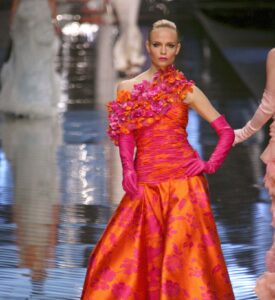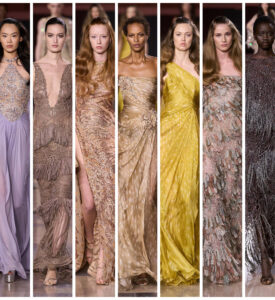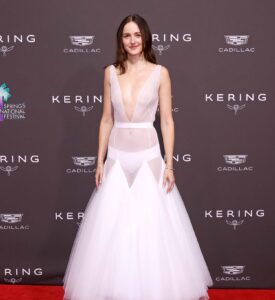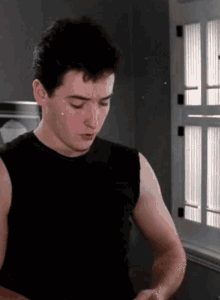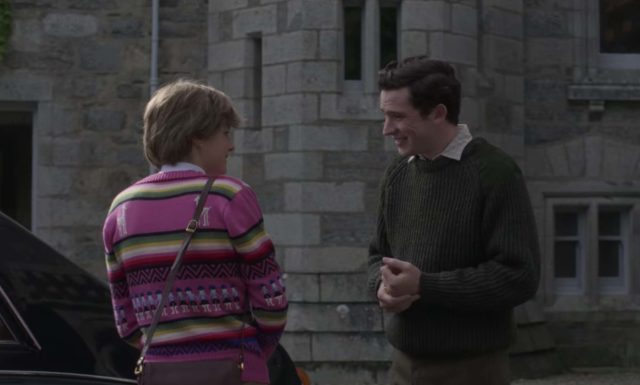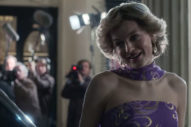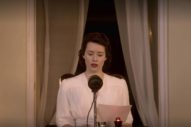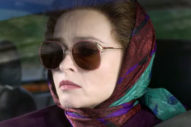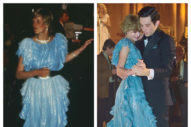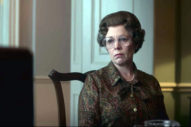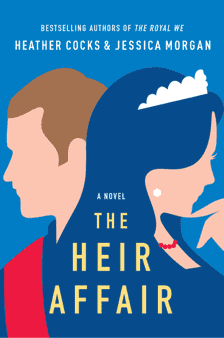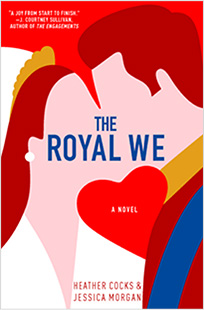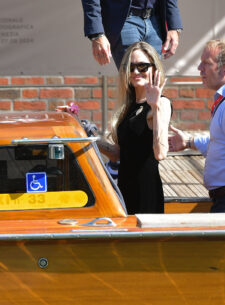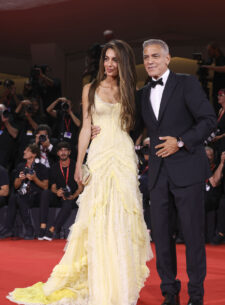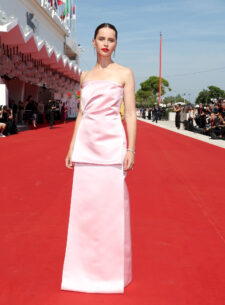The second episode of The Crown brings us two iconic outsiders simultaneously coming into the royal family orbit — Margaret Thatcher and Lady Diana Spencer — by juxtaposing their visits to Balmoral: One of them fails miserably, and one of them passes with flying (drab, sodden) colors. While both visits did happen in real life, as it was customary for the PMs to head to Balmoral and Diana reportedly did go there to pass muster, the events therein are likely heavily fictionalized (as with much of this show) to achieve the obvious goal of portraying the family as a gauntlet all its own. For me, though, the net effect was an episode that dragged. If this is all too long for you, or you just want to go straight to the comments, click here to skip right to them.
Fair warning: I continue to think this show’s expensive budget and excellent actors do yeoman’s work in concealing that at heart it just isn’t very good, and that opinion is so far unchanged. I laughed out loud in the premiere at stuff that definitely wasn’t supposed to be funny (why did Diana come off like a stalker?!? She full-on popped up in front of his car to tell him she was sorry Dickie died, a conversation that actually happened at a friend’s party) and Gillian Anderson’s performance makes me want to eat a bag of throat lozenges. She is Thatcher by way of Ralph Fiennes’s Voldemort. And now, here in season 4 episode two, we are still somehow on the outside looking in where certain people are concerned: We see the meat of this story largely through Thatcher’s eyes and then Diana’s, with the royal family’s feelings and motives frequently opaque to us — at least, in terms of the former; with the latter, it’s clear the family is hoping for Diana to knock off their socks so that Charles can stop shagging Camilla on the down-low. But with Maggie, we are left as nonplussed as she is about what anyone is thinking, whether anything is a test, or what the Queen thinks and feels about anything — because once again, Peter Morgan is more interested in making her a two-dimensional force of evil than a fully realized person, which gives Olivia Colman regrettably little to do. This show is not a character study where she is concerned; it’s simply one-hour depictions of events you’ve read about, with people swirling around her whom he thinks are far more interesting. And some of those people ARE interesting, but just because Morgan explored QEII in The Queen doesn’t give him license to ignore her here. Hopefully this will finally improve deeper into the season.
I’ll put some more specific stuff about each scene in the slideshow, but here’s the summary for each supporting character’s big story, and I’ll include a third one here at the top:
The Stag
Peter Morgan is so hot for stag symbolism. It’s all over The Queen. It’s been used in previous episodes of The Crown. And now, here, he stagjaculates all over the hour. The framing is: A stag, wounded during a pleasure hunt on a nearby estate, has crossed the river into the Queen’s estate and it’s therefore the Windsors’ to stalk and finish off. There is a lot of talk of how you DON’T CROSS THOSE LINES, meaning property lines, but of course there is an allegory dancing naked in the stream like Bridget Jones in Mark Darcy’s paddling pool. There are also a few shots of the stag stumbling around Balmoral, as Metaphor sits astride and kicks it in the hindquarters. Thatcher fails to help catch it, but guess who helps nail it? Yeah. Once Diana wins the nod of approval, the episode ends with a shot of the empty land, sans staggering stag, as if to say, “Bulls-eye.” Oh, and Philip even summons Charles for a bracing chat while the stag is being butchered, in case we missed that Charles feels emotionally skinned by his family. Stag metaphors were apparently on a big bulk discount the last time Morgan went shopping for tricks.
Margaret Thatcher
Maggie and good ol’ amiable Denis must make the annual sojourn to Balmoral, though she’s distracted by what stodgy old chauvinists she’s got in the government. Did she not KNOW them before? This show acts like she just parachuted into the PM job from Never Never Land. Anyway, they’ve heard the BRF sometimes throws in little tests for new guests. They’re shocked to be shown to separate bedrooms, surprised by the use of a protocol sheet that also contains a schedule for the evening, and startled to learn they should have brought outdoor shoes — an oversight that causes the staff to stand there in a silence that clearly says, “Mmmmkay.” The implication that Thatcher wouldn’t have any idea what to expect on that front, or any notion that the royals in Scotland do a lot of messy hunting, is wacky to me. These days she’d just hop on the Ex-PM WhatsApp thread and been like, “Packing for Balmoral! Tips?” and her predecessor would be like, “OMG, bring your Eddie Bauer duck boots.” But I mean… they DID have telephones in the Thatcher era. She could have called.
Maggie and Denis come downstairs at the appointed cocktail hour on the sheet, and find no activity at all, so they follow the sound of voices and burst into the salon to see the grubby Windsors having a muddy and breathless tea, having spent the entire day fruitlessly trying to find and kill the stag. Everyone stares awkwardly at the Thatchers until Elizabeth finally tells the kitchen to have dinner ready in 45 minutes. Philip snipes that this is absurd, as it’s only 6, which is tea time. This for me puts to pasture the interpretation that the Windsors were late while the Thatchers were on time. Because Philip knew exactly what time it was; he just had a completely different sense of what was supposed to be happening at that time. So either the protocol sheet was a test — Margaret snarks quietly to Denis that they clearly failed it — or the BRF didn’t know about it, or, more likely, we’re supposed to see that the Windsors are just pretty self-absorbed and as soon as this stag presented itself they forgot entirely that they had an obligation.
Dinner is no social triumph either, and afterward, the BRF plays a totally silly and weird tongue-twisting parlor game called Ibble Dibble, which Margaret watches in horror until she’s asked to participate. The whole point is speed, so when she slowly chokes out every word, the room grows colder and more patronizing until the action can move elsewhere. She further attempts to go on a hunt dressed in her usual clothes, cannot keep up, and pretends to go home to change. Instead, she starts to work, but sits in the wrong chair and gets a scolding from Princess Margaret, who further scoffs at Thatcher’s insistence that the economy demands her attention even on a holiday weekend. Margaret is all, “Eh, whatever,” and delivers a high-handed lecture about how all work and no play can make a person lose perspective: “Sometimes, when one has the benefit of experience, time off is the most sensible course of action.” This is rich, coming from a person whose life is perceived as ALL time off and perhaps has ZERO perspective — a conclusion that is written all over Maggie’s face.
The final indignity for Margaret comes when she’s expected to go visit a local Highland Games contest — it MIGHT be The Braemar Gathering, though that’s usually in September and we’ve been told this is summer? Earlier in the day, her stuffed-shirt cabinet members begin backstabbing her in the news about her spending cuts, and so she essentially sucks a lemon through the Tossing of Cabers and Hurling of Hammers while the royals look delighted and congratulate the athletes. Maggie spits to Denis, “I’m struggling to find any redeeming features in these people at all. They aren’t sophisticated or cultured or elegant or anything close to an ideal. They’re…” Denis pipes up, “Boorish, snobbish and rude?” She agrees: “Just like those patronizing bullies in my own cabinet.” I am so glad they connected this for us because I failed dot-to-dot in kindergarten. I guess we’re supposed to be agreeing with her, but honestly, I wanted to scream. Because the royals are in fact being cultured and gracious in appreciating this Scottish tradition, and even with how obnoxious the tea-time/cocktails snafu certainly was, I would actually feel comforted that they are capable of enjoying things. Also, Maggie, Highland Games are cool — I would love to see that! — so take that lemon out of your mouth and go suck an egg instead. Mostly, though, I just don’t know that I think Margaret Thatcher would have had expectations about the royal family that feel so borderline naive. Sure, the reality will always differ from your imagination, but she didn’t just fall off the turnip truck. And in the early 80s, when I was 6, I knew that they would go up to Scotland and wear muddy shoes and kilts and tromp around the moors and such. Come on.
Anyway, this makes her decide to go home early and pull a full Alexis Carrington with the Cabinet and FIRE THEM ALL AND REPLACE THEM. She’s going to clean house and change things from the ground up, she says, inspired by the royals being insufficiently deferential. The Queen and Margaret watch her go, amused that she’s the first PM in history to bail early on the Balmoral visit — and more than a little smug, I think, that they drove her off. I’m not really sure what the motivation would have been to do that, but they were rude and Margaret was ill-prepared and inflexible and basically it was disastrous combo of ill-suited social partners. Speaking of a disastrous combo of ill-suited partners…
Lady Diana Spencer
Charles’s occasional dates with Diana are being chaperoned by her imperious grandmother. Maybe Emma Corrin just naturally has a knowing gleam in her eye, but so far this portrayal of Diana seems a bit more knowingly flirty than I expected. In an early date to the opera with Charles, she does a long slow curtsy with eye contact that comes across as lightly seductive, but he feels too uncomfortable to kiss her goodnight because they’re not alone, and also his heart is hermetically sealed at this point. Charles will soon need to get over it, though, because everyone in his life pressures him to Get On With It where Diana is concerned. In real life, Philip expressed concern that Charles’s casual courtship would ruin her reputation if he didn’t shit or get off the pot, and Charles took that as a directive to propose — and, it’s believed, he was motivated by a lifelong desire to please his distant father, and interpreted this as a way to do it. In the show, even Camilla, while he’s trying to arrange a covert bang, tells Charles that Diana is a perfect choice because he needs a suitably aristocratic but wide-eyed young thing who will come at his beck and call (and who also isn’t married with kids).
So, during a summer when they otherwise wouldn’t have seen each other, Chaz invites Diana to Balmoral — they depict it as her car pulling up RIGHT as Margaret Thatcher’s departs, which is bizarre because Maggie left unexpectedly and early and there’s little chance Charles would have invited his paramour there DURING a PM’s visit. But, it means the Queen and Margaret can watch both the departure and the arrival through the window, AND they can shoot two car-in-driveway scenes for the price of one. Cha-ching!
Diana’s grandmother greets her and is all, “YOU HAVE ONE SHOT AT THIS. I CANNOT POSSIBLY TELL YOU HOW IMPORTANT THIS IS FOR OUR FAMILY,” and Diana nods. So, do we think Diana felt pushed into playing a role here? I don’t know what the show believes, honestly. She herself seems open to Charles, but also clearly aware that she is expected to be. She succeeds at dinner with some giggly wit, slays the parlour game of charades, and gets invited to stalk the stag with Philip (not a euphemism). She of course brought all the right outdoorsy gear, because she knows what to do.
Diana charms Philip while they hike for four hours, then is the first to spot the stag’s horns over a hill and correctly identifies — against Phil’s judgment — the direction of the wind so that Philip’s shot will hit home. The metaphor! Oh, the metaphor! Diana’s shot hits home, too, because when they return all sodden but successful, she gives Philip all the credit and Philip gives Charles a nod of approval. Even Anne later is like, “She’s perfect! Those LEGS.” Never mind that Diana has only worn baggy outdoor pants and a long dress. Charles is glum, because he can’t have what he really wants, but Anne teases him and then forcefully shoves him toward Diana out of what she believes is pragmatism: It’s time to close the book on Camilla and on the public tittering at his bachelorhood. I have no idea if Anne actually felt that way. It does feel realistic, given their closeness but also her no-nonsense demeanor, and yet the Anne of my imagination would have seen this for the looming disaster it was.
The point is, Charles was feeling boxed in and lonely and broken, and everyone convinced him Diana was the way out: a charming young bride whom he’d doubtless come to love. It was a definite tragedy that nobody in this equation seemed to think Diana’s feelings mattered, or considered what it might do to a person — especially a young and virginal one — to marry a guy who is merely looking to check off a box. The BRF would naturally be Team Charles, but also approach this as if solving that equation only affects HIM and not the person being roped into the binomial with him. This whole thing was wrong-headed, as if nobody learned any lessons from Princess Margaret’s life at all.

